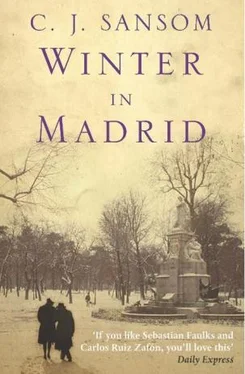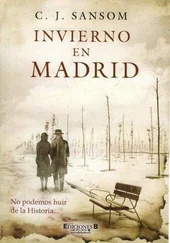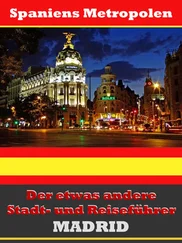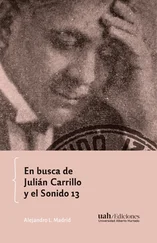‘Spain’s pretty primitive, though, isn’t it? How will we find our way around?’
Bernie pulled a battered Labour Party card from his pocket. ‘This’ll help us. I’ll introduce you to the international socialist brotherhood.’
Harry smiled. ‘Can I charge an interpreter’s fee?’ He realized that was why Bernie wanted him to come and felt an unexpected sadness.
THEY TOOK the ferry to France in July. They spent ten days in Paris then travelled slowly south by train, spending their nights in cheap hostels along the way. It was a pleasant, lazy time, and to Harry’s pleasure their easy companionship from Rookwood returned. Bernie pored over a Spanish grammar, he wanted to be able to speak to the people. Some of his enthusiasm for what he called the new Spain rubbed off on Harry and they were both staring eagerly out of the window as the train pulled into Atocha that hot summer morning.
Madrid was exciting, extraordinary. Walking round the Centro they saw buildings decorated with socialist and anarchist flags, posters for rallies and strike meetings covering the peeling walls of the old buildings. Here and there they saw burned-out churches, which made Harry shudder but Bernie smile with grim pleasure.
‘Not much of a workers’ paradise,’ Harry said, wiping a sheen of sweat from his brow. The heat was baking, a heat such as neither of the English boys had imagined could exist. They were standing in the Puerta del Sol, hot and dusty. Pedlars with donkey carts threaded their way between the trams and ragged shoeshine boys slumped against the walls in the shade. Old women in black shawls shuffled by like dusty, smelly birds.
‘Christ, Harry, they’ve had centuries of oppression,’ Bernie said. ‘Not least from the church. Most of those burned-out churches were full of gold and silver. It’s going to take a long time.’
They got a room on the second floor of a crumbling hostal in a narrow street off the Puerta del Sol. On the balcony opposite theirs a couple of prostitutes often sat resting. They would call bawdy remarks across the street, laughing. Harry would redden and turn away, but Bernie shouted back at them, saying they’d no money for such luxuries.
The heat continued; during the hottest part of the day they stayed in the hostal , lying on their beds with their shirts open, reading or dozing, savouring every tiny breeze that wafted through the window. Then in the late afternoon they would walk in the city before spending the evenings in the bars.
One evening they went to a bar in La Latina called El Toro where flamenco dancing was advertised. Bernie had seen it in El Socialista , the socialist newspaper, full of optimism and hope, which he got Harry to translate for him. When they got there the bulls’ heads round the walls startled them. The other customers were working men and eyed Harry and Bernie curiously, giving one another amused nudges. The boys ordered a greasy cocido and sat at a bench under a banner advertising a strike meeting, next to a burly brown-faced man with a drooping moustache. The buzz of conversation died as two men in narrow jackets and round black hats walked into the centre of the room, carrying guitars. They were followed by a woman in wide red and black skirts and a low bodice, a black mantilla covering her head. All had narrow faces and skin so dark they reminded Harry of Singh, Rookwood’s Indian boy. The men began to play and the woman sang, with a fierce intensity that kept his attention even though he couldn’t follow the words. They performed three songs, each one greeted with applause, then one of the men came round with a hat. ‘ Muy bien ,’ Harry said, ‘ muchas gracias .’ He put a peseta in the cap.
The big man next to them said something to them in Spanish. ‘What was that?’ Bernie whispered to Harry.
‘He says they’re singing about oppression by the landlords.’
The workman was studying them with amused interest. ‘That is good,’ Bernie said in halting Spanish.
The big man nodded approvingly. He extended a hand to Bernie and Harry. It was hard and callused.
‘Pedro Mera García,’ the man said. ‘Where are you from?’
‘ Inglaterra. ’ Bernie pulled his party card from his pocket. ‘ Partido Laborista Inglés. ’ Pedro smiled broadly. ‘ Bienvenidos, compadres. ’
SO BERNIE’S FRIENDSHIP with the Mera family began. They regarded him as a comrade, and the apolitical Harry as his slightly retarded cousin. There was an evening in early September, shortly before they were due to return to England, that Harry particularly remembered. It was cooler in the evenings now and Bernie sat on the balcony with Pedro, his wife Inés and their elder son Antonio, who was Harry and Bernie’s age and like his father a union activist in the brickworks. Inside the salón Harry had been teaching three-year-old Carmela some English words. Her ten-year-old brother, Francisco, thin and tubercular, sat watching with large, tired eyes as Carmela sat on the arm of Harry’s chair, repeating the strange words with fascinated solemnity.
At last she got bored and went to play with her dolls. Harry went onto the tiny balcony and looked out across the square, where a welcome breeze stirred up the dust. The sound of voices came up from below. A beer seller called his trade in a high sharp voice. Doves circled in the darkening sky, flashes of white against the red-tiled roofs.
‘Help me, Harry,’ Bernie said. ‘I want to ask Pedro if the government will win the vote of confidence tomorrow.’
Harry asked and Pedro nodded. ‘He should. But the President’s looking for any excuse to get Azaña out. He agrees with the Monarchists that even the miserable reforms the government’s trying to put through are an attack on their rights.’
Antonio laughed bitterly. ‘What will they do if we ever really challenge them?’ He shook his head. ‘This proposal for an agrarian reform act has no funds to back it because Azaña won’t raise taxes. People feel let down and angry.’
‘Now that you’ve got the Republic,’ Bernie said, ‘Spain must never go back.’
Pedro nodded. ‘I think the Socialists should leave the government, have an election, win a proper majority. Then we’ll see.’
‘But would the ruling classes let you govern? Won’t they bring out the army?’
Pedro passed Bernie a cigarette. Bernie had started smoking since he came to Spain. ‘Let them try that,’ Pedro said. ‘Let them try and see what we will give them.’
Next day Harry and Bernie went to see the vote of confidence in the Cortes. There were crowds round the parliament building but they had managed to get passes through Pedro. An attendant led them up echoing marble stairs to a gallery above the chamber. The blue benches were packed with deputies in suits and frock coats. The left-liberal leader Azaña was speaking in a strong, impassioned voice, one short arm beating at the air. Depending on their politics the newspapers portrayed him either as a frog-faced monster or as the father of the Republic, but Harry thought how ordinary he looked. He spoke fiercely, passionately. He made a point and turned to the deputies behind him, who clapped and shouted their approval. Azaña ran a hand through his wispy white hair and went on, listing the Republic’s achievements. Harry scanned the faces below, recognizing the socialist politicians whose faces he had seen in newspapers: round fat Prieto; Largo Caballero, surprisingly bourgeois-looking with his square face and white moustache. For once Harry felt caught up in the excitement.
‘Lively lot, aren’t they?’ he whispered to Bernie. But Bernie’s face when he turned was angry, contemptuous.
‘It’s a bloody theatre,’ Bernie said angrily. ‘Look at them. Millions of Spaniards want a decent life and they get this – circus. He surveyed the rustling sea of heads below him. ‘Something stronger than this is needed if we’re to have socialism. Come on, let’s get out of here.’
Читать дальше












